Key takeaways:
- Pro-life advocacy emphasizes the inherent value of every human life and the need for compassion and support, extending beyond abortion to healthcare and social systems.
- Access to healthcare is crucial for mothers and children; disparities in availability and experiences of stigma highlight systemic challenges that must be addressed.
- Effective strategies for navigating healthcare include utilizing local resources, building supportive networks, and encouraging clear communication during medical appointments.
- Storytelling and affirmation are powerful tools in encouraging others in advocacy, fostering a supportive community that shares successes and struggles.
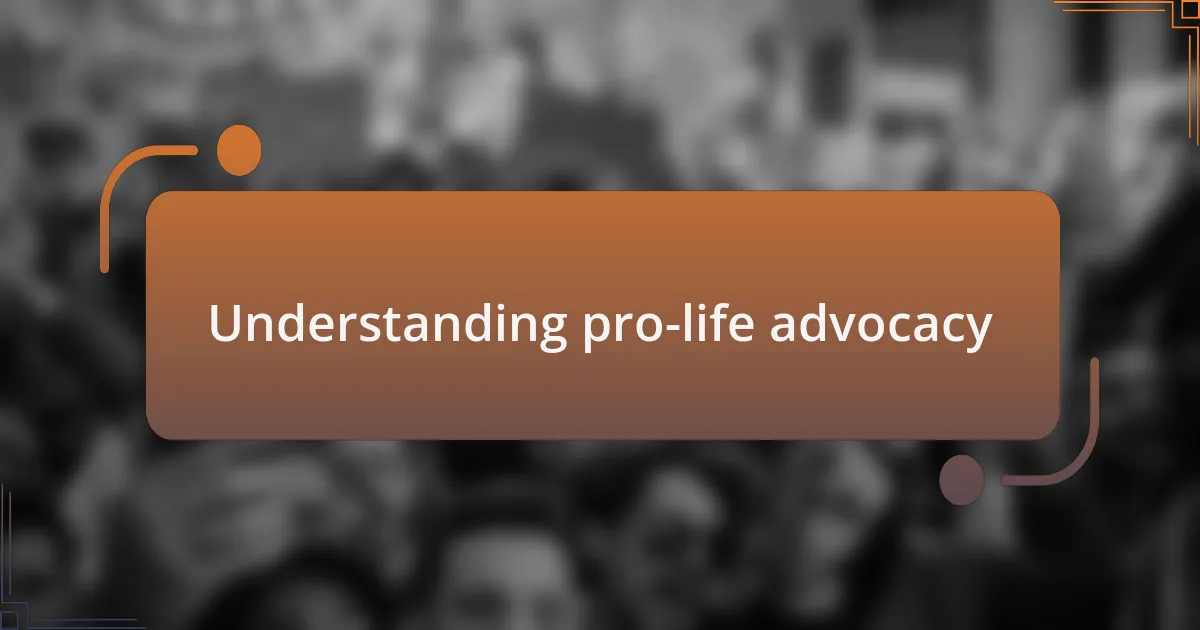
Understanding pro-life advocacy
Pro-life advocacy centers around the belief that every human life, from conception onward, possesses inherent value and should be protected. I remember the first time I attended a pro-life rally; the energy was palpable as people shared their stories of hope and resilience. It made me realize how deeply personal this issue is for so many, raising the question: how can we stand up for those who cannot advocate for themselves?
In my conversations with fellow advocates, I’ve encountered individuals who have experienced both joy and heartbreak within the context of pregnancy. One poignant story was from a woman who kept her child despite facing tremendous obstacles. Her determination inspired me; it highlighted the importance of offering support to individuals in difficult situations rather than simply opposing abortion. Isn’t it essential that we embrace compassion in our advocacy?
As I explored the various facets of pro-life advocacy, I began to appreciate how it intertwines with broader issues like healthcare access, education, and social support systems. It struck me that advocating for life doesn’t stop at birth; it extends to ensuring that every child grows up in a nurturing environment. How can we, as advocates, work towards creating a society where every life is cherished and supported throughout its journey?
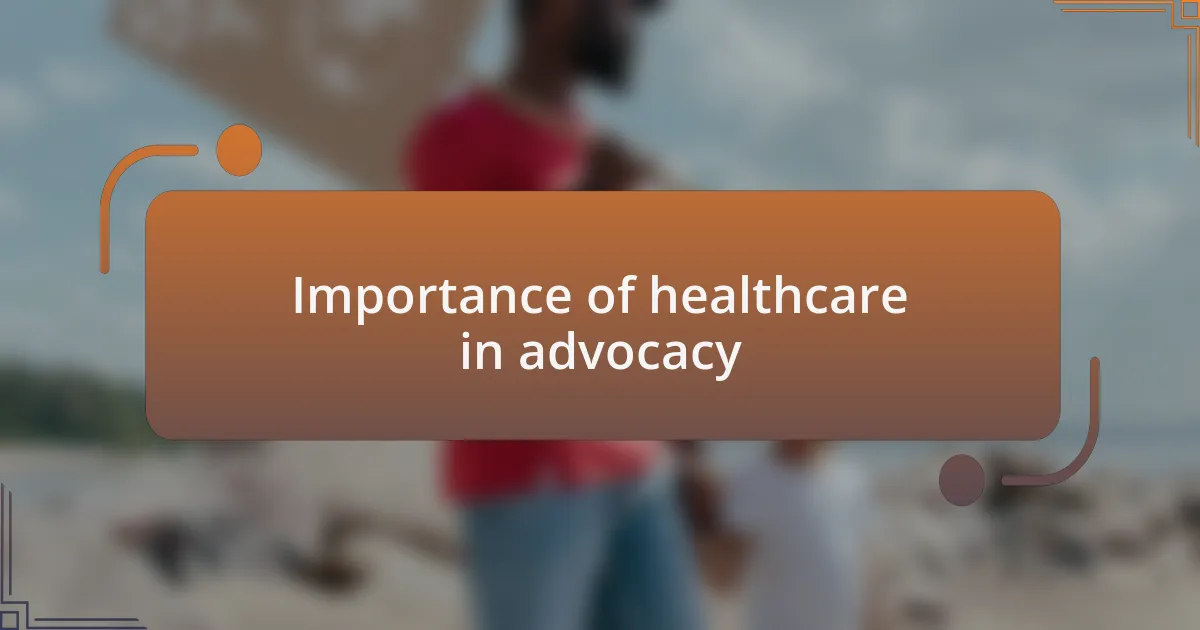
Importance of healthcare in advocacy
Healthcare is fundamental in pro-life advocacy because it directly impacts the well-being of both mothers and their children. I recall a service day at a local clinic where volunteers provided health screenings for pregnant women. Seeing the relief on their faces as they accessed critical services made me realize that healthcare access is a lifeline that can make a world of difference. When advocating for life, we must ensure that women have the support they need during pregnancy and beyond.
I’ve often wondered how we can truly support life if we neglect the health aspect. For instance, during discussions with fellow advocates, I learned about programs that connect expecting mothers with healthcare resources. These initiatives do not merely focus on pregnancy but aim to educate and empower women post-birth, emphasizing that our commitment to life must be holistic. How can we claim to be pro-life if we’re not advocating for the health and well-being of these families?
Moreover, I believe that healthcare advocacy intersects with our pro-life mission in powerful ways. I remember attending a workshop where healthcare professionals shared their stories about the struggles women face when seeking care. Those narratives were eye-opening; they highlighted gaps in the system that can leave vulnerable families feeling abandoned. It made me reflect on the questions we should be asking: What are we doing to fill those gaps? How can we become voices for those who feel unheard within the healthcare landscape?
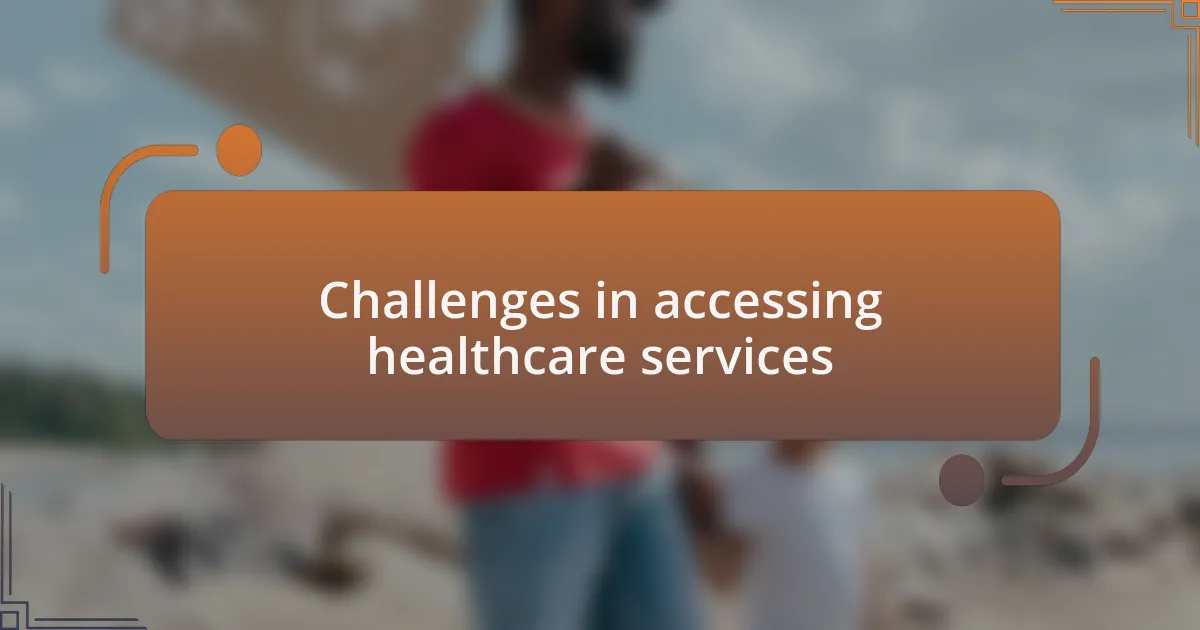
Challenges in accessing healthcare services
Accessing healthcare services presents a myriad of challenges that often go unnoticed. I remember a friend who struggled to find adequate prenatal care; despite being committed to carrying her pregnancy to term, she faced long waits and complicated insurance processes. This experience made me question: how many women are falling through the cracks simply because the system is difficult to navigate?
Another significant obstacle is the disparity in resources available to different communities. During a volunteer project, I interacted with women in underserved areas who expressed their frustrations about traveling long distances for basic healthcare services. It struck me that if access is not equitable, how can we genuinely claim to support every life? The emotional toll on these women, feeling as if their health and that of their children are secondary, is something that lingers in my mind.
Moreover, even when women do manage to access care, they often encounter stigma and judgment. I vividly recall hearing stories from advocates about individuals who felt shamed at clinics, which can discourage them from returning for necessary follow-ups. This begs the question: are we creating a healthcare environment that encourages life, or one that inadvertently creates barriers? The emotional aftermath of these experiences can impact not just individuals but entire families, underscoring the urgent need for compassion in our healthcare system.
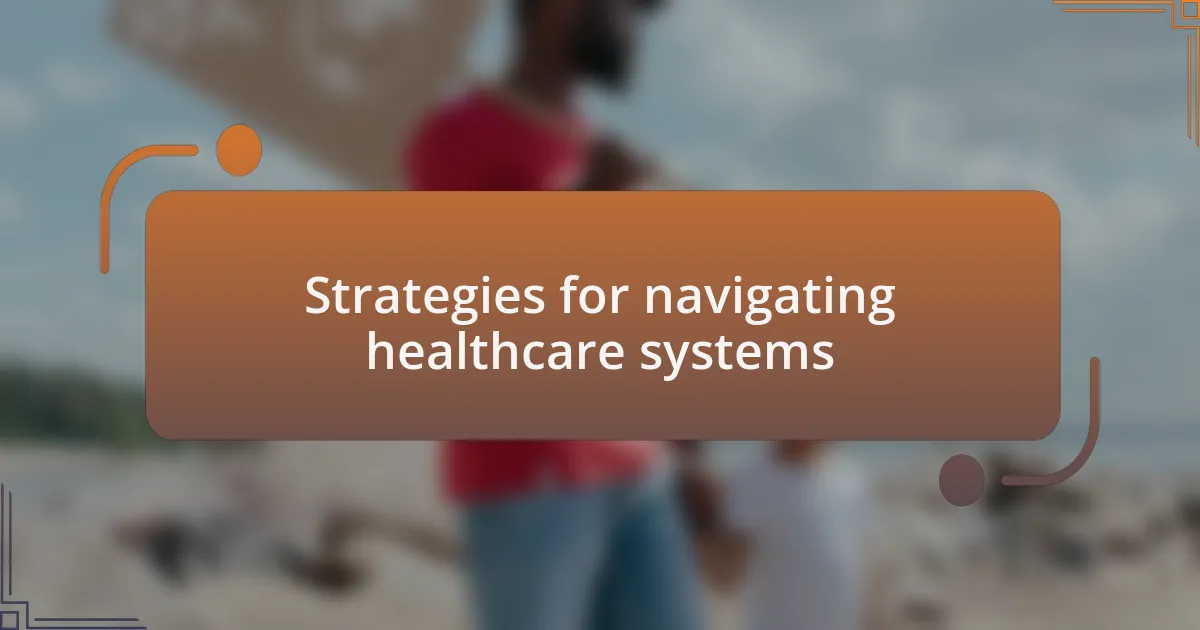
Strategies for navigating healthcare systems
One effective strategy I’ve found for navigating healthcare systems is to keep a comprehensive list of local resources. I learned this lesson during my own health journey when I connected with a community health worker who provided invaluable information about clinics that offered sliding scale fees. I often ask myself, how many people are unaware of these resources, missing out on vital support? Having that knowledge transforms the healthcare experience from daunting to accessible.
Another approach is to build a supportive network. I remember attending a support group where women shared their experiences with healthcare providers. Hearing their stories not only provided encouragement but also revealed alternative methods to advocate for oneself within the system. This experience got me thinking: how can we empower each other to navigate these complexities together? The shared knowledge often becomes more potent than any pamphlet or website could offer.
Finally, never hesitate to ask questions or seek clarifications during appointments. I was once intimidated by a complicated medical term thrown around by a doctor but learned that voicing my confusion actually led to better understanding and care. I frequently remind myself and others that if something doesn’t make sense, it’s okay to pause and clarify. After all, clear communication can be the difference between feeling lost and feeling informed.
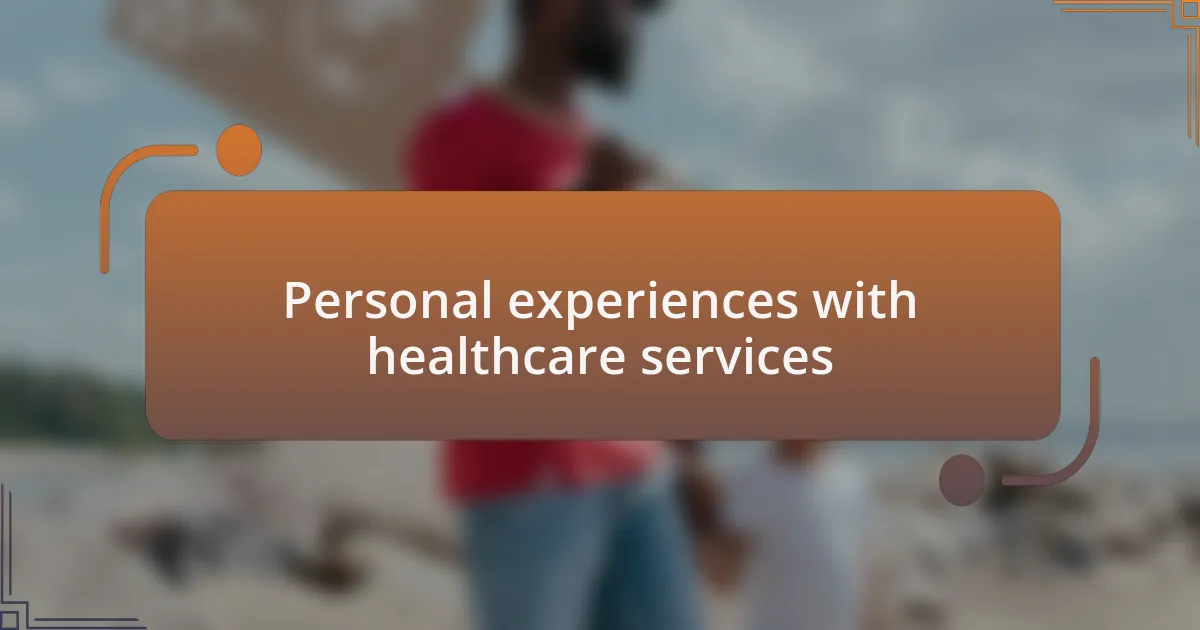
Personal experiences with healthcare services
Navigating healthcare services can often feel like walking through a maze. I recall a moment when I faced a daunting diagnosis, and my initial response was sheer panic. It was a shared experience with a nurse that became pivotal; she took the time to explain my options in layman’s terms, easing my fears. Wouldn’t it be wonderful if every patient encountered a caregiver like her?
There was a time when I found myself overwhelmed in a crowded waiting room. As I sat there, I struck up a conversation with another patient who shared her struggles with the same provider. This unexpected connection turned my anxiety into a sense of camaraderie, revealing that none of us were alone in this journey. Is there a more comforting realization than knowing others face similar battles?
I’ve also learned the power of persistence in advocating for my health needs. I once had to contact my doctor multiple times to get adequate care for persistent symptoms, something that felt uncomfortable at first. However, ultimately, my persistence paid off, leading to a diagnosis that changed everything. Reflecting on that experience, I can’t help but wonder: how many voices go unheard simply because we fear being a nuisance? It’s a question worth contemplating, especially in a system where advocacy can truly save lives.
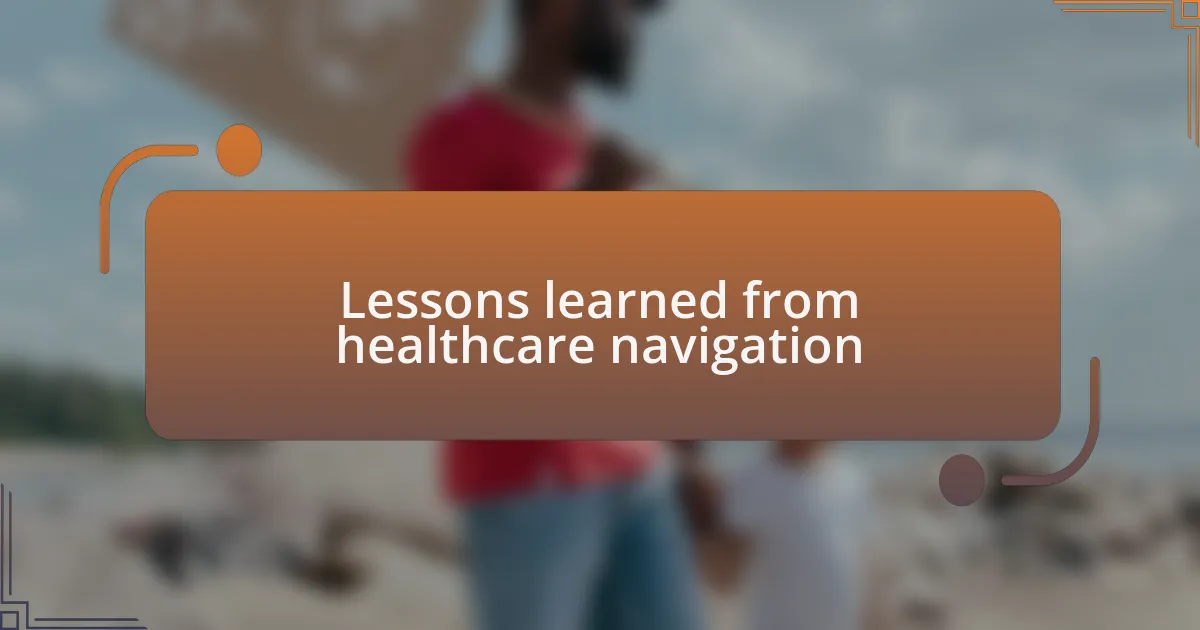
Lessons learned from healthcare navigation
One crucial lesson I learned while navigating healthcare services is the immense value of preparation. The first time I walked into a specialist’s office, I felt lost and unprepared, overwhelmed by medical jargon. Now, I make it a point to write down questions beforehand, ensuring I don’t leave without the clarity I need. How many of us have walked away wondering if we missed an important detail just because we didn’t ask the right questions?
I also discovered that being proactive about my healthcare isn’t just my responsibility; it’s a partnership with my providers. When I started bringing a family member or friend to appointments, the experience transformed. Their support allowed me to focus on the discussion rather than worrying about remembering every piece of information. Isn’t it reassuring to know that having someone by your side can make the whole process feel less intimidating?
Lastly, I found that embracing my emotions is a vital part of navigating healthcare. There were days when the weight of medical uncertainty made me feel isolated, but sharing my feelings with others revealed how relatable my struggles were. This shared vulnerability not only deepened my connections with others in the same boat but also shifted my perspective on the journey. Why do we often hesitate to express our fears when doing so can foster understanding and support?
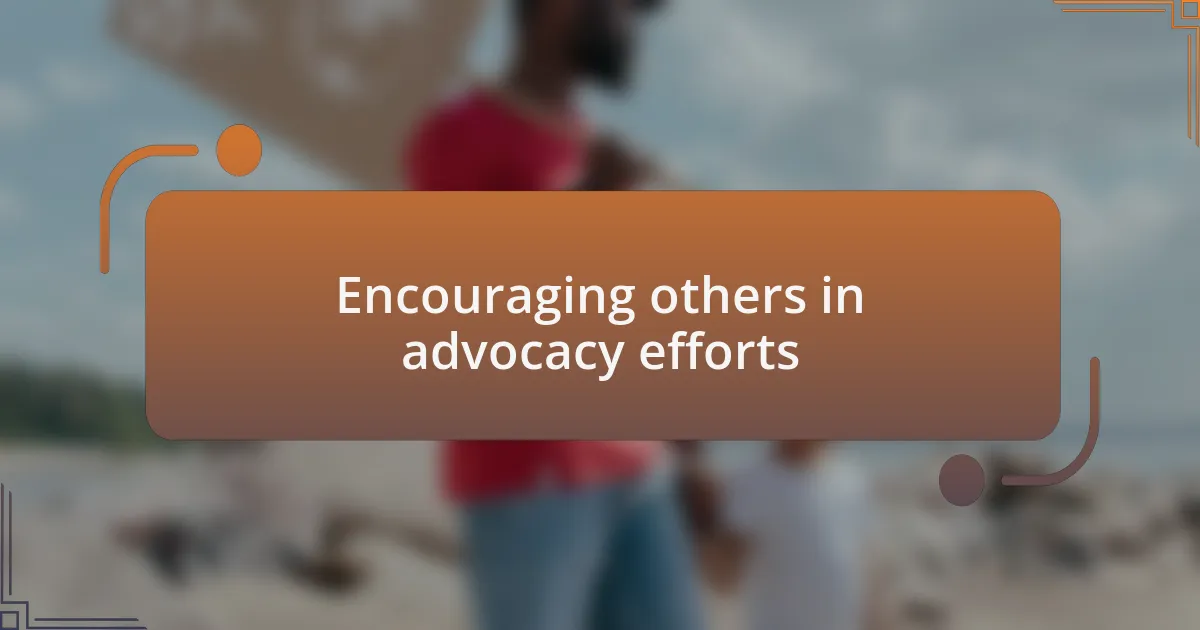
Encouraging others in advocacy efforts
When encouraging others in advocacy, I often reflect on the power of storytelling. I remember a moment when I shared my own healthcare journey at a local event, and the room fell silent as people connected with my experiences. It became clear to me that vulnerability can inspire others to step into their own advocacy roles. Have you ever noticed how a heartfelt story can spark courage in those who feel alone?
As I’ve mentored newcomers in pro-life advocacy, I’ve seen the importance of affirmation. One young woman I worked with was hesitant to speak up at rallies, feeling her voice wasn’t strong enough. I encouraged her by highlighting her insights and offering constructive feedback. Watching her confidence grow and finally share her message with passion reminded me of how crucial it is to build others up in our community. Isn’t it incredible how a little encouragement can ignite a fire in someone’s heart?
I also believe in creating spaces for dialogue. I often host informal discussions with peers, where we share not just our successes but our doubts and failures in advocacy. This openness fosters a sense of belonging and reassures everyone that they are not alone in their struggles. Have you ever experienced the relief of realizing that others share your concerns? These conversations bring us closer together and reaffirm our commitment to the cause.